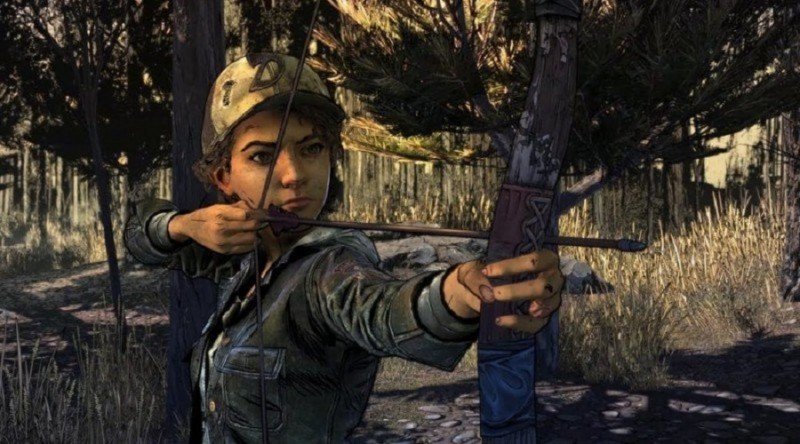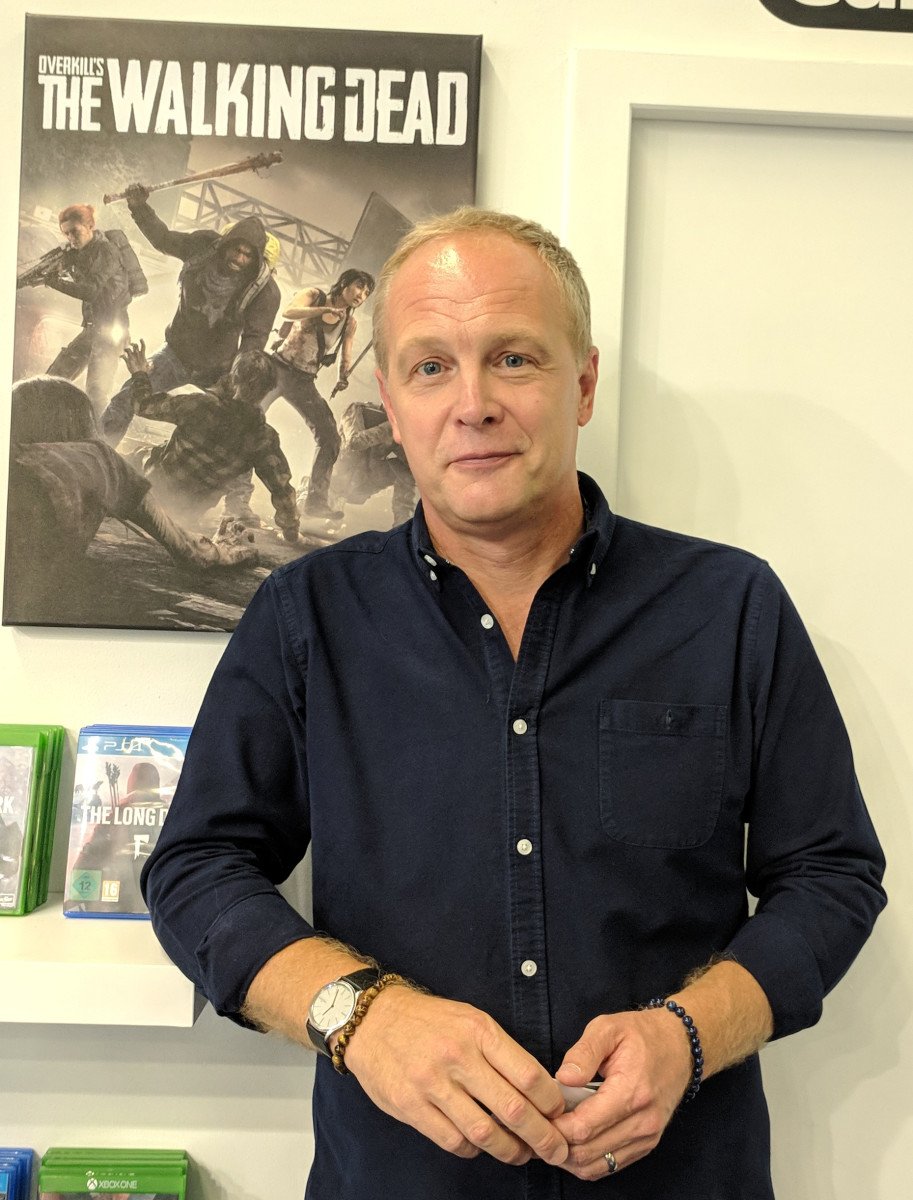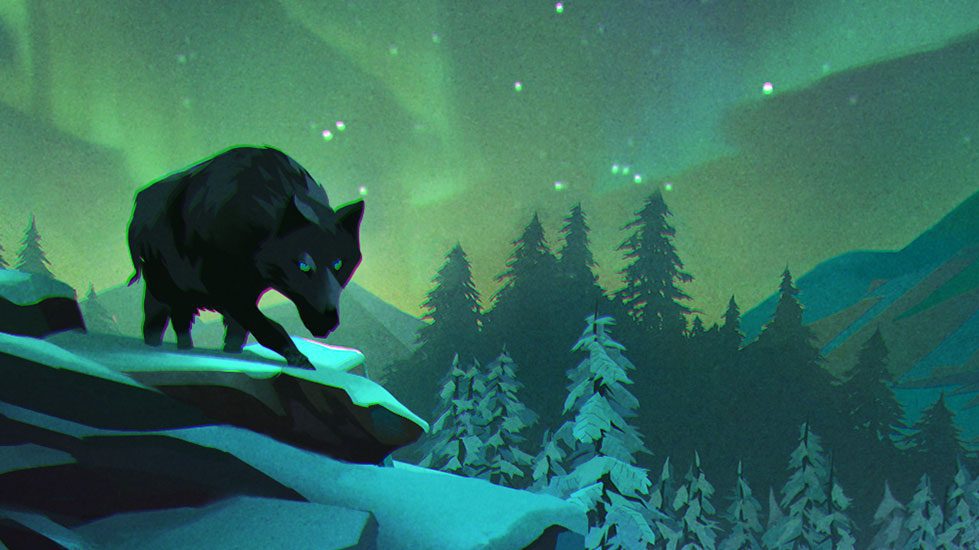
This year Skybound expanded its business further into the games market with a new department. Skybound Games works alongside Skybound Interactive to improve the way that the company takes advantage of the games space in new ways. While Skybound Interactive creates partnerships with developers to use the Skybound IPs, such as The Walking Dead, Skybound Games will publish independent games both digitally and for retail.
One of Skybound Interactive’s great successes was its deal with Telltale Games, which has sadly seen tremendous layoffs and the fate of The Walking Dead: The Final Season had been up in the air until only recently. Skybound Interactive President Dan Murray told Variety that Skybound would be working with the ex-Telltale staff to finish the story and to provide them a “soft landing.” It remains unclear, however, how many employees will have positions or for how long.
GameDaily sat down with Skybound at Gamescom, before the Telltale situation unfolded. While the company’s Interactive department will continue to create partnerships with developers and publishers, Skybound Games can create similar agreements for games published in-house, as well as taking advantage of other areas of the business.

“There are a lot of companies that are doing indie publishing,” says Mark Stanger, general manager EMEA of Skybound Games. “But there aren’t that many groups that can add to that with movie, TV, live events, merchandise, digital content creation, two and a half million subscribers that are already out there under the group umbrella. I think when we bring those elements to play that’s when we potentially deliver something really exciting for a content creator.”
Skybound was built on the back of The Walking Dead and through that has been very successful in many different industries, including areas where games have traditionally fallen short, such as film and TV. Developers looking to partner with Skybound on an upcoming game may be able to take advantage of that. Even if they had no intention of doing so.
“The guys that established and founded Skybound, Robert Kirkman and David Alpert, are themselves content creators,” Stanger explains. “Robert was the guy that wrote The Walking Dead. So when he sits with other creative types, they view things with the same eye. I think we’ve got enough genuinely creative people that when they’re looking at a new games proposition they might simply say, ‘Actually, you know what? This will make a stunning limited edition comic book series’.
“There is that expertise and we’re totally open to doing that if that’s on the developer’s mind. It may not be in some cases but they may come into the meeting in other cases where they’ve actually got comics in their mind somewhere. It’s great that we’ve got this expertise that we can say, ‘Hold on, let’s pull in the guys that can really advise on this’ and we’ve got those within the group.”
The group structure of Skybound means that Skybound Interactive and Skybound Games work side-by-side, though there’s plenty of potential for crossover. None of the established partnerships will be affected, but with this extra string to the company’s bow, there’s now more for them to offer depending on a project’s best fit.
“I’m not face-to-face with licensing partners,” Stanger says. “That’s Dan Murray and the Interactive team. They have always been their partners. That hasn’t changed. I know projects are still being discussed and are still moving forward. That continues as before and where it’s right for that particular product opportunity to go with a third-party, maybe because they’ve built on what’s happened before or because they have a particular plan they want to execute on, then let’s do that. But where it fits better within the Skybound catalog for a particular period of time because it complements what we’re doing, we’ve got that option as well, which previously we never had.”
Skybound Games’ first two projects are the physical releases of Slime Rancher and The Long Dark. Both of these games have been out digitally for a while, but these physical releases promise something unique and new. That’s very important for Stanger, it seems. It’s all very well to release a physical version of a popular digital game, but you must offer more for the gamer in doing so.
In everything that Skybound do the approach is creator-centric. So it’s working with the guys that have actually created the game and collectively work out what the best approach is to get it to market.
“It really helps if, as in the case of Slime Rancher and The Long Dark, they’ve had a positive history with an active community,” Stanger says. “A community that has been talking passionately about why they play the game and why they really enjoy the game. It’s also helpful if there are hooks that we can continue to build the story on, and if the developer is happy to invest the time to work with us to add something to the game. That way, when we take it from the digital domain into the physical domain there’s a reason why you would then go out and buy it. With both of the two launch products there’s added value, both physical added value in the box and there’s digital added value in the game that hasn’t been seen previously.
“So although the games have been in existence for some time, we’re adding elements that nobody’s seen before. And actually with Slime Rancher it was more than that. It had been released on Steam and Xbox Live Arcade, but had never been released on Sony platforms. So September marked the debut on Sony platforms both digitally and physically.”
Despite the fact that both of these games have been out for a while, that’s not de rigueur for the publisher. Developers can approach Skybound Games at any point of development to discuss potential partnerships.
“I don’t think there’s a one-size-fits-all in terms of a certain threshold in time by which we have to engage developers,” Stanger says. “Both of our two launch titles had already been released. They were fundamentally finished games but we still thought there was a really exciting opportunity. We’re equally having conversations at a much, much earlier stage with developers and looking to engage at a much earlier stage. We’re open. There isn’t one fixed model for that.

“For us in the short to medium-term we believe the sweet spot is probably eight to ten titles a year. A combination of other people’s IP, where we’re publishing on behalf of the development studio. In the longer term, complemented by our own IP as well.”
Stanger was keen to clarify that IP ownership is not something that Skybound Games is eyeing greedily: “We’re not making it the precondition that if we’re working with an external developer with their own IP, that as part of the publishing agreement that has to then move across to us. That isn’t part of the approach. If we jointly feel that that’s the right thing to do then fine but that isn’t in any way a precondition. In everything that Skybound do the approach is creator-centric. So it’s working with the guys that have actually created the game and collectively work out what the best approach is to get it to market.”
Skybound says partnerships don’t stop at blue sky ideas like movie and TV deals or merchandising lines, but can be as granular and helpful as, essentially, an in-house digital agency.
“Even with the release of the first two titles we’ve brought in experts within the Skybound group to help us,” Stanger explains. “So whether it’s been talking about influencer activity, whether it’s been about creating digital content, video content that we can use as part of our social media marketing activity. The live events team have come in and talked to us about live events opportunities. So we have already leveraged other parts of Skybound group. And they’re genuine experts within their fields. I think they add something to the overall publishing plan.”
So what can developers do to get involved?
“Reach out! Our contact details are on the usual places. On the website and social media channels and LinkedIn and so on. We’re getting more and more active in supporting events like gamescom, GDC, PAX. We’re at the places where the developers tend to be. They can imagine when they look at Skybound the kind of games that we might be interested in. If they have something, we’d love to meet them.”
Full disclosure: GameDaily parent company Greenlit Content has worked in the past with Skybound as a client. GameDaily’s coverage remains objective.
 GameDaily.biz © 2026 | All Rights Reserved.
GameDaily.biz © 2026 | All Rights Reserved.